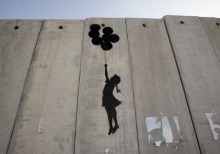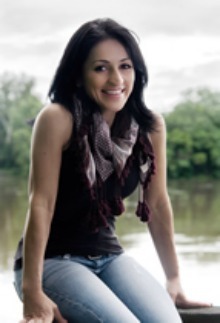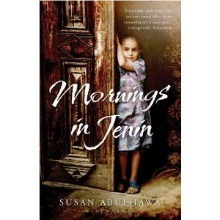Matt Rees's Blog - Posts Tagged "susan-abulhawa"
My burst Jerusalem bubble
 My taxi pulled up at the traffic lights on the way into Jerusalem late Sunday night. A half dozen Breslav hassids were bouncing up and down in front of the traffic, waving signs and grinning with the exultation of wedding party dancers. They were singing, “Death to the Arabs.”
My taxi pulled up at the traffic lights on the way into Jerusalem late Sunday night. A half dozen Breslav hassids were bouncing up and down in front of the traffic, waving signs and grinning with the exultation of wedding party dancers. They were singing, “Death to the Arabs.”Welcome home, I thought. Something dark descended on me. I’d been away for a week attending a literature festival in Dubai. I’d become close – quickly, as can often happen at a conference which keeps you within the confines of a hotel for many days – with a number of exiled Palestinian writers who initially wanted to chat with me about my Palestinian crime novels. As the car beside my taxi honked its horn in time to the murderous chant, I thought of those writers, those beautiful, intelligent souls, and soon enough I found a way out of the darkness.
I’ve made a bubble for myself in Jerusalem. I’m neither Israeli nor Palestinian. I admit that I don’t really participate in either culture. I’ve enjoyed that detachment, because it leaves me to focus on my writing, free of distractions such as caring what the hell happens around me.
In this case, the bubble burst. I had to decide what I would let in through those fractured defenses. Would it be negativity, anger at the jumping scum at the traffic lights whose idea of a response to the slaying of an Israeli family in a settlement near Nablus two nights before was to call for more blood? No, I knew I could fill the space with the books of the Palestinian writers I had met while I was in Dubai.
For the rest of this post read my blog The Man of Twists and Turns.
The sensitive creativity of Susan Abulhawa, whose “Mornings in Jenin” is as powerful a rendering of the disasters of recent Palestinian history as has ever been written, with a universal, human quality of great rarity. The poetry of Nathalie Handal, politically committed and yet mystical. Or Raba’i al-Madhoun, who wrote “The Lady from Tel Aviv,” engaging with Israel and what it has meant in his life, rather than wishing for death to its people.
Thanks to them, I’ve never felt more strongly that literature is the power in my life. Because its subtlety overwhelms the ugly, one-way thinking of politics.
Graham Greene wrote that “when you’ve lived in a place for a while, you cease to read about it” (“The Quiet American”.) That had happened to me, too, here in Jerusalem. It’s been a while since I read much Palestinian or Israeli literature. I think that was a mistake. It meant that my perception of the people who lived around me was too much colored by the stupid politics, by the bouncing fools who want the other guys to die so they can do as they wish.
That won’t happen again.
Published on March 17, 2011 04:59
•
Tags:
arabs, graham-greene, israel, israelis, jerusalem-dubai, jews, literature-festival, nathalie-handal, palestine, palestinians, raba-i-al-madhoun, susan-abulhawa
Writing on the wall
 I lifted the spray can and wrote a big, blue P. The letter bled and blurred. "Oh, I messed it up," I said. “Spray closer to the wall, Matt,” my friend Walid told me. No problem. I just moved onto the next section of concrete. Unfortunately, there’s plenty of wall.
I lifted the spray can and wrote a big, blue P. The letter bled and blurred. "Oh, I messed it up," I said. “Spray closer to the wall, Matt,” my friend Walid told me. No problem. I just moved onto the next section of concrete. Unfortunately, there’s plenty of wall.Miles and miles of it, in fact, winding as far as I could see. It ran down the hill from where I stood among the rubble and trash at the edge of Aida Refugee Camp, past an Israeli guard tower to the main checkpoint into Bethlehem. As I always do when I wander these militarized hinterlands, I wondered if there was a soldier with his gun trained on me. I sprayed the rest of my graffiti: “Playgrounds for Palestine."
It’s the one act of “vandalism” that none of my nice bourgeois friends would click their tongues and frown over. In fact, it’d raise a grin and even boost my street cred. So much street cred that you’ll probably want me to do it on your behalf (read to the end of this post to find out why…) I was spraying the name of a US charity which brings swings and slides and merry-go-rounds to Palestinian children. Spraying it on the 40-foot-high concrete barrier that Israel built in the last decade around many Palestinian towns; in this case the birthplace of Jesus.
I didn’t go to Bethlehem this week just to spray the name of this group, worthy though that would’ve been. (If you want to know how worthy, check out their site and see the work they’ve done for kids in the West Bank, Gaza, and refugee camps in Lebanon and Syria.) I had decided to make a short video telling the story of some of the kids who’ve enjoyed Playgrounds for Palestine’s Bethlehem facilities.
It was in Bethlehem, in a school called Dar el-Kalima which stands on the ridge above Dehaisha Refugee Camp (home to Omar Yussef, the detective character in my Palestinian crime novels), where the group’s first playground was built. The project started a decade ago when Susan Abulhawa, a Palestinian-American writer, brought her little daughter to visit Palestine and discovered an almost total lack of facilities for children’s play.
Since then Abulhawa, who lives near Philadelphia, has published an international bestseller, “Mornings in Jenin,” an emotionally wrenching saga about the tragedy of a Palestinian family which she turns into a love story that will stay with you forever. With the help of Playgrounds for Palestine’s volunteers, she has also managed to construct 15 playgrounds for Palestinian children.
How important is this? Well, the Bethlehem area is home to 180,000 people. There are two public playgrounds. Neither of them is very big. In fact, you wouldn’t look twice at them in an American or British park. Both are mobbed on weekends and aren’t in easy walking distance of places like Aida Camp which, I should add, abounds in children.
Other Palestinian towns are even worse off.
Read the rest of this post on my blog
Published on March 31, 2011 02:59
•
Tags:
aida-refugee-camp, bethlehem, dehaisha-refugee-camp, israel, israeli-wall, omar-yussef, palestine, palestinians, playgrounds-for-palestine, security-barrier, susan-abulhawa
A Voice for her People: Susan Abulhawa’s Writing Life interview
 Susan Abulhawa is a unique voice in contemporary fiction. She’s a Palestinian, born in Kuwait to a refugee family. She spent some years in an orphanage in East Jerusalem, her ancestral city, before university education in the US and she now lives near Philadelphia. She’s the founder of a wonderful charity, Playgrounds for Palestine, which aims to bring merry-go-rounds, slides and see-saws to the children of the West Bank and Gaza, as well as to refugee camps in Syria and Lebanon. As you’ll see from this interview, Susan’s writing life revolves around a leap she made at which many would balk. So that she could write her wonderful novel
Mornings in Jenin
, she mortgaged her house, went to a war zone, and returned with a passionate drive to write. What she wrote is a wrenching portrayal of a Palestinian family from 1948 – the foundation of Israel, which Palestinians call the “nakba,” the catastrophe – on through the civil war in Beirut and the second intifada. Mornings in Jenin is a bestseller whose poetic prose carries the resonance of the best Arabic fiction (writing which, due to the relative paucity of translation into English, we rarely get to enjoy; Susan wrote her novel in English). This many-faceted book has at its heart the most profound and tragic love-story imaginable. As a depiction of a violent history and of the bonds between lovers and siblings, Abulhawa’s novel gives a human voice to a people so often cast as a stereotype. How does she do it? Here’s what she has to say:
Susan Abulhawa is a unique voice in contemporary fiction. She’s a Palestinian, born in Kuwait to a refugee family. She spent some years in an orphanage in East Jerusalem, her ancestral city, before university education in the US and she now lives near Philadelphia. She’s the founder of a wonderful charity, Playgrounds for Palestine, which aims to bring merry-go-rounds, slides and see-saws to the children of the West Bank and Gaza, as well as to refugee camps in Syria and Lebanon. As you’ll see from this interview, Susan’s writing life revolves around a leap she made at which many would balk. So that she could write her wonderful novel
Mornings in Jenin
, she mortgaged her house, went to a war zone, and returned with a passionate drive to write. What she wrote is a wrenching portrayal of a Palestinian family from 1948 – the foundation of Israel, which Palestinians call the “nakba,” the catastrophe – on through the civil war in Beirut and the second intifada. Mornings in Jenin is a bestseller whose poetic prose carries the resonance of the best Arabic fiction (writing which, due to the relative paucity of translation into English, we rarely get to enjoy; Susan wrote her novel in English). This many-faceted book has at its heart the most profound and tragic love-story imaginable. As a depiction of a violent history and of the bonds between lovers and siblings, Abulhawa’s novel gives a human voice to a people so often cast as a stereotype. How does she do it? Here’s what she has to say:How long did it take you to get published?
It felt like forever. There was an 8 years span from the time I started writing Mornings in Jenin until it was finally published in 2010.
Would you recommend any books on writing?
I’ve never read a book on writing. I’m told that I should and I probably will one of these days. When I was writing Mornings in Jenin, I did get one as a gift. But I didn’t get beyond the first chapter. I don’t think my hesitation had anything to do with the book’s merits though. I just put it down when it talked about developing an outline or sketch of the story. I knew that I would never do that – write an outline or think ahead. So I just didn’t invest any more time in something that was going to lead me in a direction that my brain would not appreciate. I’m not a planner by nature. I follow my heart, usually into disasters and heartaches. But sometimes it takes me into miracles. Regardless, I’m just not very good at following instructions. The book I got was more or less that, or at least that’s how I perceived it and that’s why I put it down. That said, I just read Tony Parson’s answer to this exact question and he mentioned writing at least 1000 words a day. Apparently he got that advice from a book and I’m taking it from him. It’s a good bit of advice and has served me well for the past few days since I read it.
I’m sure Tony will be glad to hear it. What’s a typical writing day?
I would get up at 5am, make coffee, and sit at my keyboard and write straight through until it was time to wake my daughter up for school at 8am [she was in elementary at the time; now she’s up at 6 so that timing doesn’t work as well]. Then I’d start again from 9:30 until noon. The rest of the day I spent helping out at my daughter’s school, running or yoga, and a million other things single moms do.
That was then, when I had mortgaged my house for its full value so I could afford not to work and concentrate on writing. Now I’m paying off that mortgage and have to work a full time job as a medical writer, putting those biology degrees to some use. So I write when I can. Usually in the wee hours of the morning, in rare moments of blissful quiet and solitude, on trains, or when I’m depressed and therefore don’t care if everything else piles up.
How would you describe what “Mornings in Jenin” is about? And of course tell us why’s it so great?

It’s a story of love, and how that love is shaped by violence and persistent oppression – Love between a farmer and his land; between siblings; between a man and a woman; a mother and her children; a father and his children; love between friends. I think it’s up to readers to decide if it’s great or not. I’ll say that I put my heart into it. That ultimately my intentions in writing this story distilled to a single purpose – to be true to the characters by telling their stories with honestly, authenticity, and humanity.
Read the rest of this post on my blog
Published on April 08, 2011 01:24
•
Tags:
arabic, gaza, interviews, middle-east, mornings-in-jenin, palestine, palestinians, susan-abulhawa, west-bank, writers, writing-life



